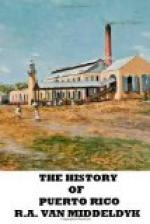In the beginning the natives showed themselves willing enough to assist in these labors, but when the brutal treatment to which the people of la Espanola had been subjected was meted out to them also, and the greed of gold caused their self-constituted masters to exact from them labors beyond their strength, the Indians murmured, then protested, at last they resisted, and at each step the taskmasters became more exacting, more relentless.
At the time of the arrival of the Spaniards the natives of Boriquen seem to have led an Arcadian kind of existence; their bows and arrows were used only when some party of Caribs came to carry off their young men and maidens. Among themselves they lived at peace, and passed their days in lazily swinging in their hammocks and playing ball or dancing their “areytos.” With little labor the cultivation of their patches of yucca[12] required was performed by the women, and beyond the construction of their canoes and the carving of some battle club, they knew no industry, except, perhaps, the chipping of some stone into the rude likeness of a man, or of one of the few animals they knew.
These creatures were suddenly called upon to labor from morning to night, to dig and delve, and to stand up to their hips in water washing the river sands. They were forced to change their habits and their food, and from free and, in their own way, happy masters of the soil they became the slaves of a handful of ruthless men from beyond the sea. When Ponce’s order to distribute them among his men confirmed the hopelessness of their slavery, they looked upon the small number of their destroyers and began to ask themselves if there were no means of getting rid of them.
* * * * *
The system of “repartimientos” (distribution), sometimes called “encomiendas” (patronage), was first introduced in la Espanola by Columbus and sanctioned later by royal authority. Father Las Casas insinuates that Ponce acted arbitrarily in introducing it in Boriquen, but there were precedents for it.
The first tribute imposed by Columbus on the natives of la Espanola was in gold and in cotton[13](1495). Recognizing that the Indians could not comply with this demand, the Admiral modified it, but still they could not satisfy him, and many, to escape the odious imposition, fled to the woods and mountains or wandered about from place to place. The Admiral, in virtue of the powers granted to him, had divided the land among his followers according to rank, or merit, or caprice, and in the year 1496 substituted the forced labor of the Indians for the tribute, each cacique being obliged to furnish a stipulated number of men to cultivate the lands granted. Bobadilla, the Admiral’s successor, made this obligation to work on the land extend to the mines, and in the royal instructions given to Ovando, who succeeded Bobadilla, these abuses were confirmed, and he was expressly charged




